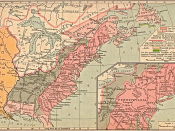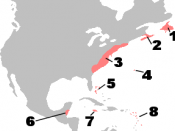Early in the 17th century, England began a depression. After much debating, the English powers came to some simple conclusions. Trade was the key to success, in order to prosper England had to export more than it imported. They also realized that they could become more prosperous by exporting luxuries as opposed to importing them. Some things, however, could not be produced in England had to be imported. The easiest solution was to use colonies where the products could be produced. This brought a new found value to the English North American Colonies. In order to better gain from the existence of it's colonies, England passed a series of acts intended to impose certain limitations and requirements on it's colonies.
The first of these acts was the Navigation Act of 1651. It was intended to impede the Dutch carrying trade. The act stated that nothing or no one from America, Asia, or Africa could come into England, Wales, Ireland or any other English colony unless they were in English vessels.
Costal trading had to be done in English ships in England and in the colonies. This was done in part to ship the trade center from Amsterdam to London.
In the seventeenth and eighteenth centuries the most important export for French Canada was fur. Colonial Virginia also had useful goods such as tobacco. This brought to the realization of the English that their colonies may have many more untapped resources that they could take advantage of. In 1650, English parliament banned foreign ships from the colonies. Later to enforce the earlier law from 1651, the English proposed the navigation act of 1662. This act stated that items that were transported into England must to be in their original ship or in an English ship to enter any of the English...


